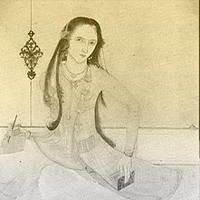Profile of Zebunnisa Begum
Zebunnisa was the daughter of the Mughal emperor Aurangzeb Alamgir. She was born on February 15, 1638, from the womb of Dil-Ras Bano. According to the tradition of the royal court, the palaces and the surrounding areas were decorated and bands were played. For a whole four months, the markets continued to be in celebratory spirits. A Hafiz and a teacher were arranged in the court for her training and education. She had memorized the Qur'an at the age of eight. After memorizing the Qur'an, more teachers and educators were invited to the court for higher education by the royal court, including Mulla Saeed Ashraf Majndrani from Iran. He was assigned to teach Zebunnisa. Mulla Saeed Ashraf was also well versed in the art of poetry. He helped Zebunnisa to develop her own taste in poetry. At the age of 21, she learned Hadith, Jurisprudence, and other sciences from Mulla Saeed. Along with Persian language, she also learned Arabic language and literature and wrote a Qasida as her first word in Arabic. Aurangzeb had no natural attachment to poetry and did not like poetry. That is why there was no poet in Aurangzeb's court. Contrary to her father's wishes, Zebunnisa made poetry a focal point of her life, but the fear of her father was such that she started writing poetry at the age of 14 but never recited it. Instead, she would write down what she said in a diary and keep it hidden so that her father would not see it. Zebunnisa's secretive choice was known to her teacher, Mulla Saeed, and he encouraged her and corrected her poems as well. Zebunnisa's contemporaries included some remarkable poets like Nasis Ali Sirhindi, Mirza Muhammad Ali, Mulla Har Gani, Aqil Khan Razi, Behrooz, Nemat Khan Ali, etc. The court of Zebunnisa was in fact an academy. Among the books written by Zeb-ul-Nisa is the translation of Tafsir-e-Kabir. Only the "Divan-e-Makhfi" is found as her main poetic work. She was never married and died in 1701, six years before her father.

